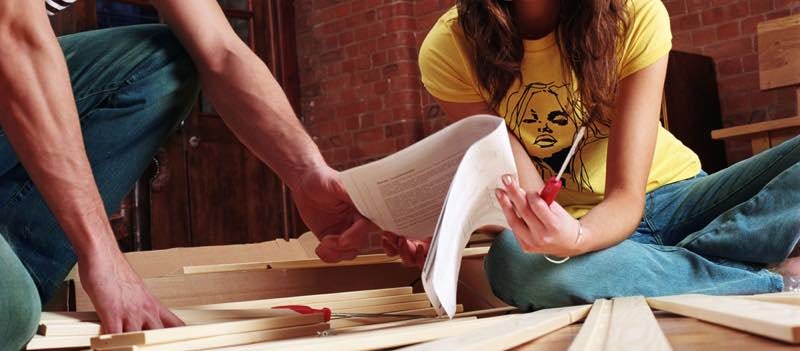The IKEA effect: why DIY brings happiness
Studies show we cherish things more when we're involved in making it. This is called the IKEA effect. This comes as no surprise, speaking from my own perspective I'm not sure there even needed to be a study to prove this. But it's good we now have a name for this phenomenon.
The IKEA effect doesn't only apply to the construction of mass-produced Swedish furniture though, it can apply to any difficult but worthwhile task. This turns out to be a hack to living a happier and more fulfilling life.
How the IKEA effect works
Effectance motive is the drive to manipulate and control elements in the world. Some psychologists describe effectane motive as a basic need almost as important as food and water. Not having to lift a finger and living as a Roman Emperor might sound like a luxury but you'd eventually feel empty. The below extract from the IKEA effect research paper goes on to say:
"A large body of research has pointed to the centrality of labour to people’s well-being (Blustein 2008), with the feeling of productivity serving as an important goal for many people (Hsee, Yang, and Wang 2010; Keinan and Kivetz 2011)."
It makes sense from an evolutionary perspective that we receive a "happiness reward" for being productive and competent. Unfortunately, much of what we call work today has become pointless, especially in the office. Very few people are getting the IKEA effect from sending emails or compiling a PowerPoint deck.
Examples of the IKEA effect
Here are some recent examples of when I’ve been conscious of the IKEA effect:
Gardening: Whether planting from seeds or just watching house plants grow, there's something extremely satisfying about tending your own plants. Every springtime there's an opportunity to try something new. I've recently been monitoring the daily slow growth of poppies on my balcony.
Roasting coffee: You definitely enjoy the taste of coffee that little bit more when you've been involved in the roasting process. The fresh-roasted coffee smell is a reward in itself.
Making yoghurt: I had no idea making yoghurt was so easy. The lockdown has given many of us more time to experiment in the kitchen. I've also made Kefir which is super easy, next on the list is ricotta cheese.
Learning to surf: The IKEA effect doesn't only apply to making something, it applies to any worthwhile task. The enthusiasm children have for learning new skills and acquiring knowledge diminishes into adulthood, there's no reason for this to happen other than laziness and because society accepts it.
Cutting my hair: Because of lockdown, just like many other people around the world, I was forced to experiment with cutting my hair. I'm quite proud of my efforts which either means I've done an okay job or the IKEA effect is biasing my judgement!
Growing vegetables: I used to have an allotment and there was nothing more satisfying than bringing home a bunch of homegrown courgettes, beans and sweetcorn.
DIY: Up until recently I've shied away from anything DIY related. It was an area of mystery that I hired a handyman for. I'm not building houses yet but feel satisfied with doing basics around my rental property and my home.
Cooking: Needless to say, we've all been cooking at home since coronavirus. Things undoubtedly taste that little bit better when you've done the work versus dialling for a delivery.
The anti-IKEA effect
Life has become too easy as companies want to do everything for you. If groceries being delivered to your front door isn't convenient enough, then many go a step further with frequent Deliveroo meals. What's next, a service that spoon-feeds your takeaway? Here are some examples of the anti-IKEA effect at play, the things that detract and make us less happy:
Instant/ready-made anything: You can't take much satisfaction from cooking a Sunday roast that comprises of ready-made Yorkshire puddings, instant gravy granules and frozen roast potatoes and veg.
Deliveroo: A step up from instant food laziness is having someone make it and deliver it to your doorstep. The advent of online food delivery has made a generation lose out on the feel-good IKEA effect of making a tasty homemade dinner.
All-inclusive holidays: Too lazy to plan your holiday from eating out to entertainment? Then all-inclusive holidays are for you. The format normally involves getting drunk and sitting by the pool every day. I can't imagine how these ready-made holidays make any worthwhile memories.
Instant entertainment: Too much Netflix, video games or screen use, in general, isn't good. Active entertainment that involves you getting better at something (or just being outside) will always leave you more pumped up with the brain's happiness hormones.
New build homes: I live in a new build flat in London (there's a lot of them). Nothing needs changing or repairing, every flat has the same bathroom, kitchen and flooring. Owning a home that needs work and doing it yourself is deeply satisfying which many attest too.
Summary
All human beings want to feel competent and purposeful. Not only do we all feel better when doing more ourselves but we often save money to boot. What's not to like?


















